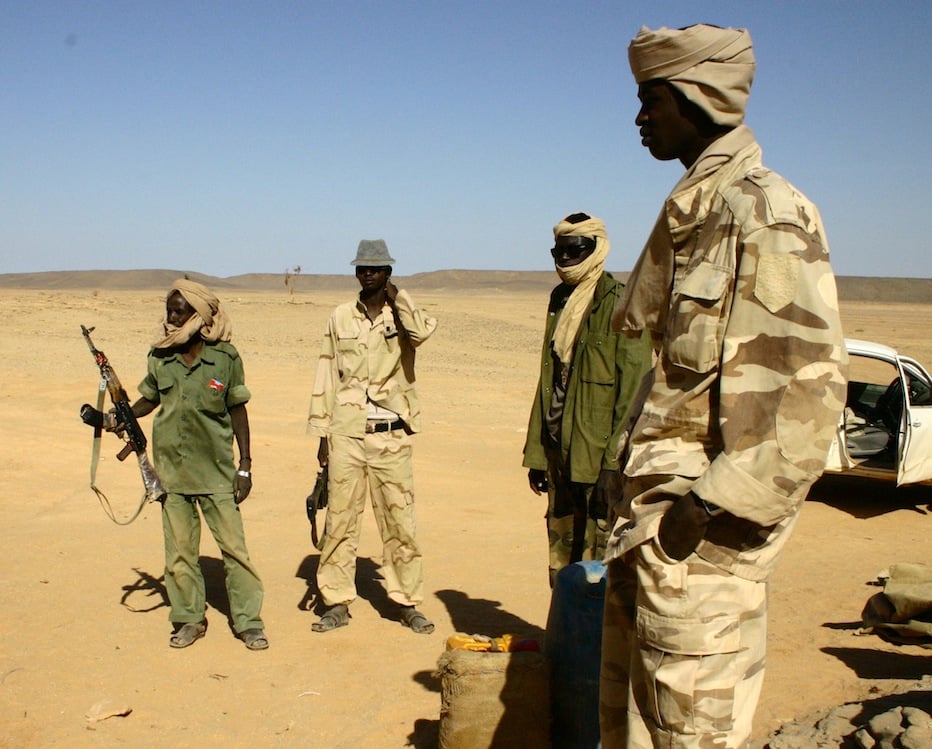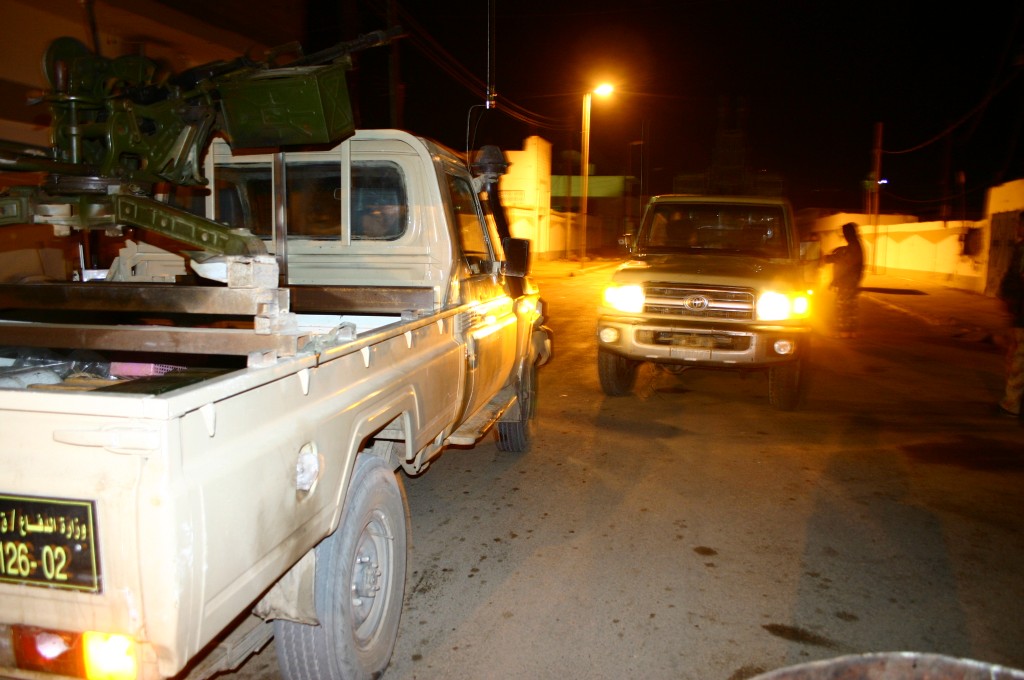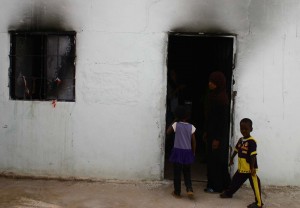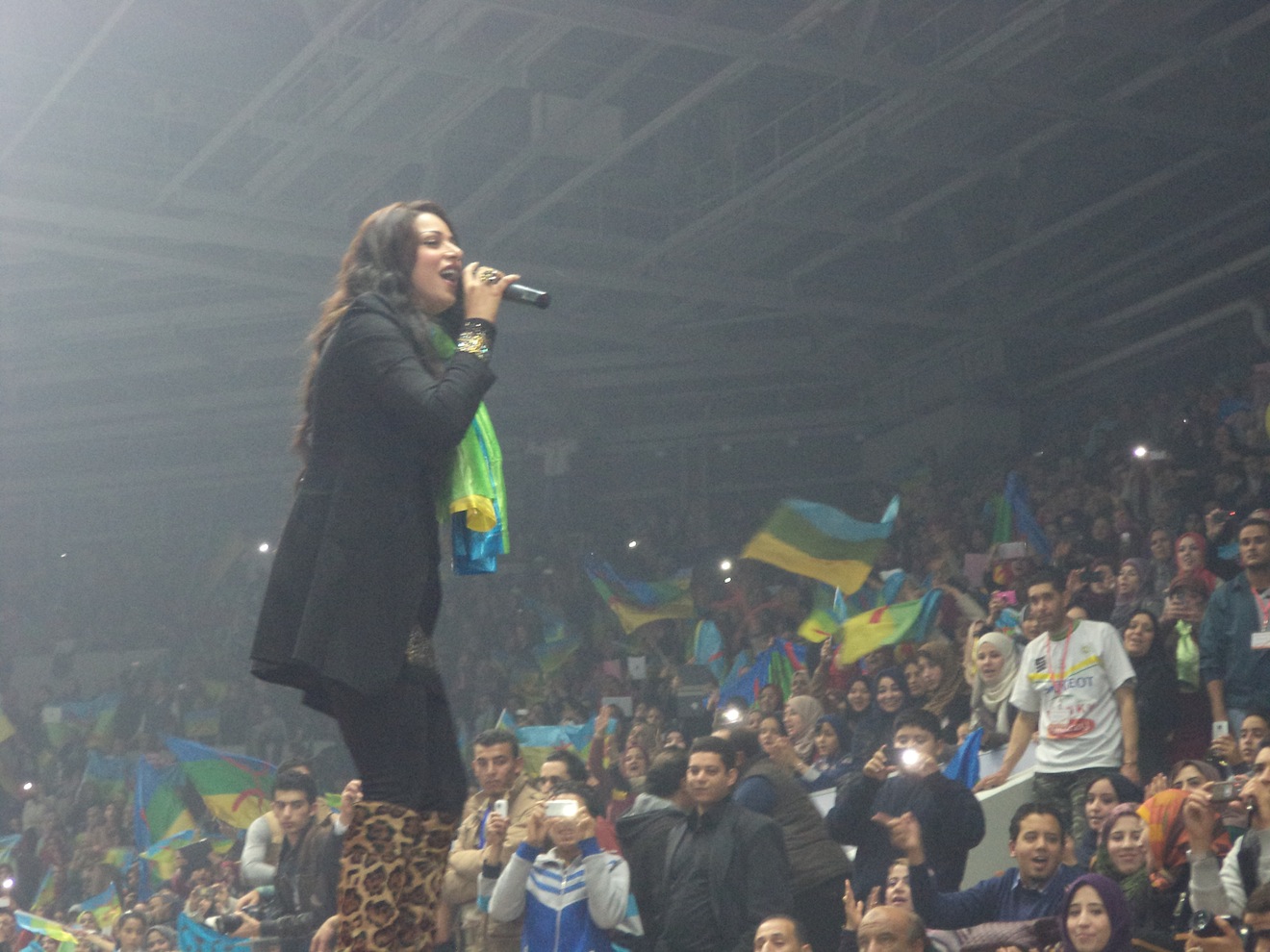By Beata Oleksy.

Tripoli, 13 January 2013:
The small military campsite overlooking desert routes from Chad, Niger and Sudan is hidden behind a . . .[restrict]rocky outcrop. For the past year this place has been home to Tebu militiamen patrolling Libya’s southern borders. They fight illegal migration and trafficking under Issa Abdel Majid Mansour, the Tebu commander from Kufra.
The length of the country’s southern frontiers — nearly 4,600 kilometers — make it exceptionally hard to control. International criminal groups use the Salvador Pass on Libya’s border with Algeria and Niger as the main transit point for their activities in North Africa. While smuggling contraband from the southwest to the eastern border with Egypt they pass through Tebu-controlled territory.
The Tebu feel neglected and unequipped by the government. With ageing and worn-out vehicles that had already suffered the 2011 liberation war, they cannot compete with the drug traffickers. They also sense that their participation in the national struggle against Qaddafi has not been properly recognised.
Struggle for identity
The Tebus who are indigenous to the south of Libya, northern Chad and Niger, were marginalised for decades by Qaddafi. His discriminatory policies deprived them of citizenship, housing and medical care.
In the 1970s, he launched a military operation in northern Chad with the intention of annexing the Aouzou strip. During the conflict many Chadian Tebus fled their war-ridden country to Libya. In order to support his territorial claims Qaddafi granted many of them citizenship.
In 1994, the International Court of Justice decided that the Aouzou Strip belonged to Chad, and a few years later Qaddafi passed a decree to remove Libyan nationality from many Tebus – and not just those who had earlier fled to Libya. In response Abdul Issa Mansour, formed in Kufra the Front for the Salvation of Libyan Tebus. In 2008, a major Tebu uprising was brutally crushed by the regime.
When the war broke out in 2011, the Tebus understood that this is their time and they rose against Qaddafi. “We liberated all military bases in the south and protected the oil fields” – says the commander of the Al-Weig military camp, Sharafeddine Barka Azaiy.
The post-war reality, however, brought considerable disappointment to Tubu’s revolutionaries who remained an important power in the south but again faced allegations of being foreigners.
In 2012, the Tebus were in fully fledged conflicts with local Arab tribes in which about 350 people died and hundreds were wounded. As yet, negotiations have not come up with a sustainable answer, as a result of which there are still regular outbreaks of violence.
Kufra military zone
A 150-kilometre wall built by the Arab Zway tribe surrounds Kufra. Tebu say the project has isolated the neighbouring Tebu oasis of Rybiana located some 200 kilometrtes west in the Sahara and which is dependent on food supplied by Kufra. The Zway argue that the wall protects the town from Chadian criminals involved in carjacking and armed robbery. This argument reinforces the Zway claim that many Tebus are lawbreakers and not Libyans.

“The problems always erupt when Issa Mansour comes to the town. He takes advantage of the situation for his personal benefits”, says Majabra Magharba from Kufra Local Council. The Tubus, however, are emboldened by their contribution to the war against Qaddafi and are demanding a state-led solution to the citizenship issue, better social service and access to political power.
The chief commander of the revolutionary Brigades, Osama Al-Fakheri, from Benghazi explains that the Kufra Military Zone is divided between Tebu and Zway areas. Coalition is placed on the demarcation line between the two and 20 check-points have been established around the town to secure the ceasefire. “Unfortunately during the last six months ten people were killed by both sides”, he adds.
Fakheri thinks the problem also has a strong political dimension “The Tebus were never represented in the local institutions and their cause was absent in the media”. He believes that the reconciliation process will take a long time and requires strong intervention from the state. Colonel Mabruk Al-Ghazwi, head of the Military Zone, recently posted to Kufra, is more positive. He thinks the situation will improve gradually.
”All these incidents are individual-based. We are neutral and will not allow for any violent clashes occur again”, he says.

Meantime, the atmosphere in the town is very tense. In order to move between Tebu and Zway areas we were accompanied by a government mediator, Walid Khaled Bashir from Tobruk. He facilitates contact between the authorities and the conflict parties, reports on violations of the peace agreement and monitors the situation on the ground.
“Since most of the local institutions, including offices, banks and the hospital, are located in Zway quarters, I try to enable Tebu’s access to services,” he explains. The Tebus say that they need military escort in order to even receive medical care although this is denied by the administration who say that Tebu women often use the hospital’s facilities.
In a large room in the Tebu quarter, Sadea Ali, surrounded by other women, is grieving for her son. A week earlier 22-year-old Musa together with his father went to the Zway-controlled town centre to register his new-born brother. When he left the building somebody shot at them. The Zwey say that it is not just Tebus who suffer. “Similar accidents happen to us. Tebu kills our people too,” says Majabra Magharba from Kufra local council.
Bashir believes that the current situation does not give a chance for a durable solution. “Military zones, marshal law and tribal divisions will not bring peace to Kufra. Serious reconciliation programmes should be implemented”, he says.
Living in peace
Swaidiya on the outskirts of Kufra is a place where all tribes leave in peace as if the brutal clashes had never taken place. This quartier, relatively well off compared to other areas, was built during the Libyan war with Chad by a construction company from Sweden.
The houses were designed for soldiers deployed in the town. However, around 300 extra apartments were built, so it was decided that they would be distributed among the local population. The administration director of Swaidiya was a men from Tobruk not involved in local conflicts. When people applied for apartments he gave them numbers and they did not know who would be their direct neighbour.
Today it is a unique example of a place where everyone lives in harmony. Just a few kilometres from Kufra town centre which sees fights and hate crimes every couple of weeks, here in Swaidiya, tribal affiliations do not seem to matter. [/restrict]











